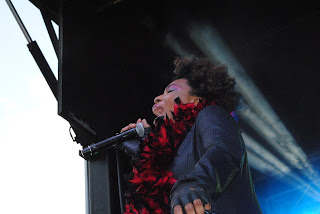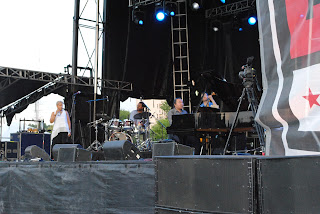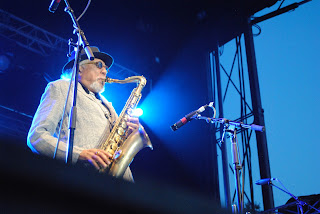 |
| Legends Stage |
This year’s Atlanta Jazz Festival marks the fortieth year of
one of the largest free jazz festivals in the country. With strong corporate
and community support the festival is a celebration of music, a drawing
together of neighborhoods near and far and a kick off to the summer season here
in Atlanta. To celebrate this milestone, the Mayor’s Office of Cultural Affairs
commissioned a book of pictures, photographs taken from the Festival’s forty-year
history, that best captures the spirit of this tremendous yearly spectacular.
The coffee table book features the work of photographers Jim Alexander, Ernest
Gregory, Susan Ross, Michael Reese and Julie Yarborough and can be purchased by
linking here.
So far, the weather has cooperated and the festival seems to
be enjoying record crowds. I was able to
attend part of Friday night’s session. The evening started out with the
Pedrito Martinez Group at 7:30 pm on the main stage which by all accounts had
the house rocking. I got there in time to catch the genre bending Robert
Glasper Experiment which was the headliner on the Main or Legends Stage at 9
pm.
 |
| Robert Glasper |
Glasper is a contemporary pianist and keyboard artist who
often plays in a modern trio format as well as his more progressive, electronic
group The Experiment. He recently won the Grammy for his work on the soundtrack
to Don Cheadle’s Miles Davis movie Miles
Ahead as well as for his fifth studio album from 2012 Black Radio. His work is an amalgam of R & B, Hip/Hop, Groove
based music with jazz oriented improvisations.
Glasper came onto the Legends stage in high spirits. It
appeared as if he was feeling no pain, amusingly rapping with the audience before
he even got started about how they should show their appreciation for him and
his group, whether or not they were any good, because the concert was free.
This version of the Experience featured Glasper on keyboards, Casey Benjamin on
saxophone and vocoder, Mike Severson on guitar, Burniss Travis on electric bass
and Justin Tyson on drums. The band started with “Cherish the Day” a Sade tune from
his Black Radio album and proceeded
with a set of mostly groove based tunes that had the crowd vibing. Mr. Benjamin has an arresting voice with a
high range that he processes along with his saxophone through a vocoder. The
eerie sound can be compelling but is best used sparingly. Guitarist Severson
whose credits include work with singer/rapper Bilal, showed some gutsy rock playing that at times recalled Carlos Santana’s
guitar work. Glasper was most effective
when he played solo, a dedication of sorts to Miles Davis whose birthday was
the day before, on the Cyndi Lauper pop tune that Davis memorialized into the
jazz canon “Time After Time.” The crowd sang willingly along and glassy eyed Glasper
seemed to have them all in the palm of his hand.
 |
| Randy Weston |
On Saturday I made my way to the Legends Stage and caught
the first few songs of the maestro Randy Weston and the infectious sounds of
his African Rhythms Quintet. Mr. Weston, an incredibly vital ninety-one-year old,
brought together a stellar group of musicians on the big stage. Joining Mr.
Weston was his core group of T.K. Blue on alto saxophone, Alex Blake on contrabass
and Neil Clarke on percussion. The tenor saxophone legend Billy Harper, a longtime
collaborator also played on this gig. To watch Mr. Weston bounce his feet while
playing his piano with such exuberance is a real treat. Harper’s tone is so
focused, mellow and penetrating as to be its own reward. The group just played
beautifully swinging and deeply soulful music.
I made my way across the throngs of people, past the rows of
tents, the spread blankets, the myriad of camper chairs, the parade of porta-potties
and countless concession stands to the Contemporary stage in anxious
anticipation of Nicholas Payton’s performance scheduled for 5:30pm. The lawn
that faces the bandstand was brimming with people for yards and yards. It was a
beautiful day and the crowd was into a party. At forty-three, New Orlean’s born
trumpeter Nicholas Payton is a force to be reckoned with. He has made his bones
touring with such legends like Elvin Jones and Marcus Roberts. He received a
Grammy for “Best Instrumental Solo” for his work on the album Doc Cheatham
& Nicholas Payton from 1997. While his work is always evolving, his
distinctive, rich trumpet is always at his ready command. He is a prolific
writer and social commentator who has challenged conventional thinking on
racial inequities.
 |
| The Crowds swelled at the Contemporary Stage |
For this concert, Payton brought his group from his recently
released Afro-Caribbean Mix Tape
album, and sat behind a stack of keyboards, his trumpet was mounted to his
right on a bracket that allowed him to both blow and play keys simultaneously. Turntable
artist DJ Lady Fingaz deftly maneuvered the scratches and taped vocals into the
flow of the music. Bronx bopper Daniel Sadownick laid down the Afro-Cuban
groove on percussion, with Joe Dyson on drums and Vincent Archer on bass.
Payton’s grooves skillfully integrate musical influences developed from world
influenced beats, harmonies and melodic roots. At the same time his signature
clarion trumpet utilizes a variety of notes, slurs and trills that complement
the music brilliantly. It was especially interesting to listen and watch as the
rhythmic patterns developed by Fingaz’s turntable melded so seamlessly with
Sadownick’s congas and Dyson’s rhythmic patterns.
 |
| Nicholas Payton |
I hurried over to the New Gen stage, quite a trek at the far
end of the park, to catch the Marquis Hill “Blacktet” which started at 6:30 pm.
Marquis Hill was new to me, but he and his group of young pumped up musicians,
thrilled the smaller more intimate crowd at this venue. The twenty-nine-year
old Hill is from Chicago and won the prestigious Thelonious Monk Trumpet
Competition in 2014. He is considered one of the new wave of players to be
reckoned with. The group did a set of tight, well-conceived music, mostly
standards, but rearranged by Hill and company to better express their modern sensibilities.
With Hill on trumpet and, was the formidable Mike King on Fender Rhodes, Josh Johnson
on alto sax, an animated Jeremiah Hunt on bass and Jonathan Pinson on drums. I
caught a few songs the most recognizable was a potent version of the Herbie
Hancock standard “Maiden Voyage.” Hill claims Donald Byrd as a major influence
and one can see some similarities, but the young man has a fluid style that is
rapidly becoming his own. It was interesting to see Nicholas Payton checking
out the younger Hill from the sidelines.
 |
| Marquis Hill, Jeremiah Hunt and Josh Jackson on the Next Gen Stage |
I made my way back to the Contemporary stage to catch a few
songs of one of the evenings headliners Macy Gray and take some pictures. Ms. Gray
has a distinctive, gravelly voice that can be very engaging. As a seasoned entertainer,
she played to the large overflowing audience with aplomb. She wore a slick, dark gray leather gown with
a red and black boa and pink shoes. I surveyed the lawn in front of the stage
and it was more overflowing then I had ever seen in in the last two years of
being here. A very impressive showing for an artist whose appeal is more pop
than jazz. The band was tight and professional and Ms. Gray accommodated the
crowd with some of her popular favorites like “I Try.”
 |
| Macy Gray |
I moved my way to the Legends stage to try to catch some of
Rene Marie’s act. Ms. Marie looked elegant in her tightly clipped silver gray
hair, wearing a white tunic over black pants. Ms. Marie, a talented singer who
writes much of her own music, finally achieved some national recognition when
her last album Sound of Red was one
of those nominated for Best Jazz Vocal Album for 2016. She brought a stellar
cast of musicians with her on the Legends stage including pianist John Chin,
bassist Elias Bailey and drummer Quintin Baxter. Inspired performances by the
energetic pianist Chin and a masterfully bowed solo by Bailey added to the set.
 |
| Rene Marie, Quintin Baxter,ELias Bailey and John Chin on the Legends Stage |
Ms. Marie has a beautiful voice with a full range and a sophisticated
delivery that is quite compelling. Her bluesy, soulful sound is always a treat
and she was warmly received by the enormous crowd.
The evening’s top bill on the Legends Stage was saxophone
and flute legend Charles Lloyd who started just before nine pm. The seventy-nine-year
old Mr. Lloyd was nattily attired in his signature pork pie hat, blue deck
shoes and a white loosely fit blazer under a horizontally stripped deck
pullover shirt. Mr. Lloyd is a west
coast musician who has a long and storied history of going his own way. In the sixties,
he was musical director for drummer Chico Hamilton’s Group and was with
Cannonball Adderley’s Group for Two years. In 1965, he formed a legendary quartet with
pianist Keith Jarrett, bassist Cecil Mc Bee and drummer Jack De Johnette, whose
recording Forest Flower was one of the
first crossover jazz albums to sell over a million copies. His experiments with
fusing psychedelic rock, avant-garde and free jazz were revolutionary.
 |
| Charles Lloyd |
The always morphing Lloyd still attracts top talent as his
most recent rhythm section demonstrates. On the stage, he was joined by the
facile Reuben Rogers on upright bass and the ubiquitous Eric Harland on drums.
Rogers was in top form as he pushed the pulse along with Harland’s dancing
traps. Mr. Lloyd rocked the music, his spindly figure wielding his large tenor
as if it was one with his being. Lloyd has a youthful energy that he
communicates through his horn and the two younger musicians were visibly prodded
on by his enthusiasm. On one tune, Mr. Lloyd picked up his flute and started to
play a soulful peppered vamp that Mr.
Rogers countered to with his own staccato response. It was quite
entertaining to watch the younger musicians follow the lead of the master.
As the evening wore on the crowd started to dissipate, as
many were there from mid-afternoon. For the truly fanatic, there was a sold-out
Jazz Jam, hosted by local drummer “Little John” Robert’s and his All-Star Band
and featuring trumpet master Russell Gunn and percussionist Mino Cinelu, after eleven
pm at the Park Tavern at Piedmont Park.
If you missed the events of the last two days you still have
Sunday when the lineup will include local saxophonist Frank Houston, trumpeter Darren English,
chanteuse Kemba Cofield, Cleveland Jones, singer Julie Dexter, Joe Gransden’s
Big Band, trumpeter Russell Gunn and saxophonist Kebbi Williams and the
venerable crooner Freddy Cole to name just a few.


